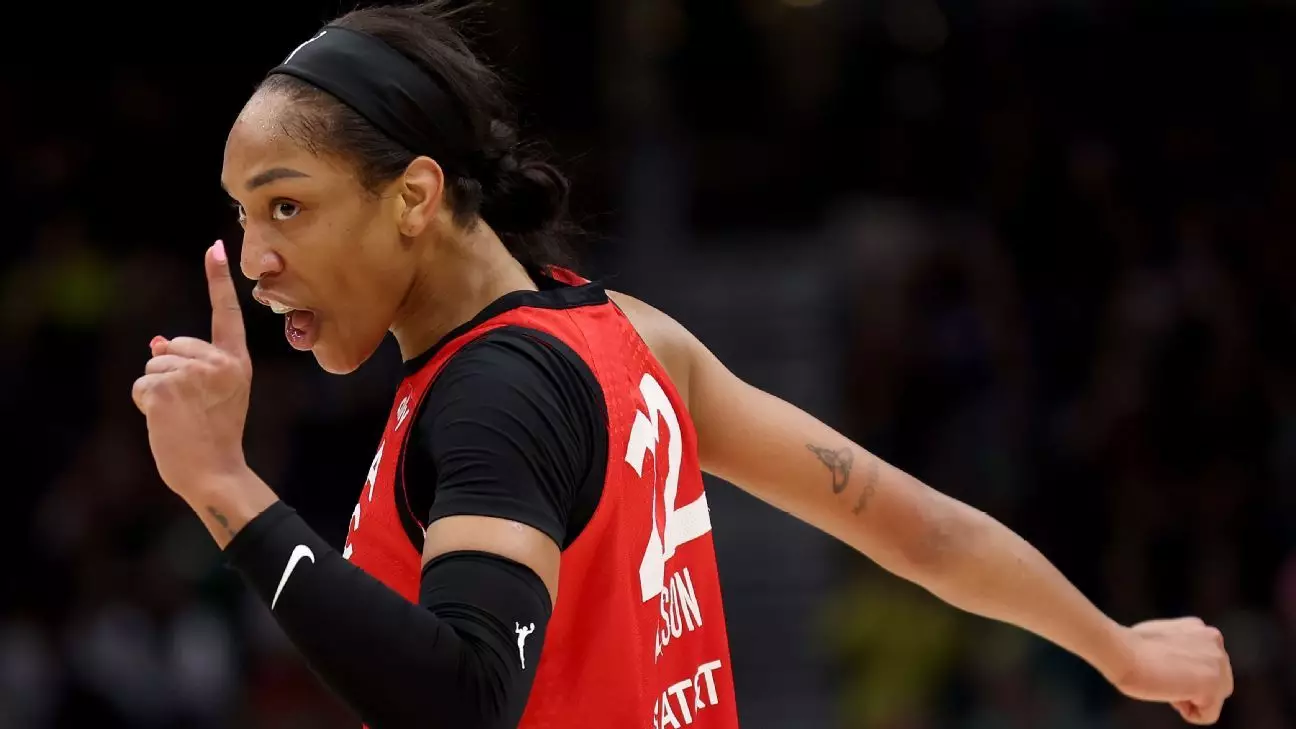The world of women’s basketball recently witnessed A’ja Wilson of the Las Vegas Aces etch her name into the annals of history with a series of monumental achievements. The young star has not only shattered the WNBA scoring record but also claimed the single-season rebounding record, a feat that places her firmly among the elite athletes in the league’s narrative. Her recent performance against the Seattle Storm, culminating in an 85-72 victory, has blurred the lines between personal success and team dynamics, and it invites closer scrutiny of her contributions both as an individual player and as a team leader.
A Dual Triumph in a Single Season
The gravity of Wilson’s accomplishments cannot be understated. Not only did she break the WNBA’s single-season scoring record by becoming the first player to surpass 1,000 points, but her recent rebounding success also demonstrates her versatility on the court. Surpassing injured rookie Angel Reese’s rebound record stands as a testament to Wilson’s all-around skills. The robust nature of the WNBA, combined with Wilson’s unyielding ambition, has crafted an environment where her achievements are both celebrated and contextualized within the larger struggle of being competitive.
Surprise and Humor After Breaking Records
Interestingly, Wilson herself appeared taken aback by her record-setting rebounding achievement, as evidenced in her post-game commentary. It is not often that a player shatters multiple records in one season, yet her approach seems nonchalant, even humorous. A playful exchange with her coach, Becky Hammon, highlighted her unlikeliness to chase rebounds aggressively. This facet of her personality reveals an athlete who prioritizes scoring as her primary mission, showcasing a simplicity in her focus that is both refreshing and noteworthy.
Team Dynamics and Coach Support
Hammon’s insights into Wilson’s rebounding abilities portray a deeper understanding of her player’s psyche. The anecdote about Wilson’s sudden burst of rebounds when prompted underlines the coaching strategies that can ignite a player’s hidden potential. This dynamic highlights the essential partnership between coach and player, demonstrating that feedback, even if trivial, can lead to an exponential increase in performance. Hammon’s ability to read Wilson’s needs by combining humor with constructive criticism captures the essence of effective coaching. It raises questions about how much untapped potential lies within other star players who may require similar nudges to elevate their gameplay.
Contemporary athletes are increasingly aware of how their records can affect the team’s trajectory. The Las Vegas Aces clinching their home-court advantage for the playoffs is a direct result of not only Wilson’s individual brilliance but also the team’s collective resilience. After an inconsistent mid-season performance, where they dropped four of their first six games post-Olympic break, a turnaround illustrates not only Wilson’s adaptability but also her leadership qualities. Her refusal to focus on seeding in the playoffs underscores a mentality centered on performance rather than accolades, presenting her as a source of inspiration for her teammates.
A’ja Wilson’s record-breaking feats have ushered in a new era for women’s basketball, where individual accomplishments contribute to team success. Her accomplishments echo the hard work that goes unnoticed, drawing attention to the vital role that training, coaching, and psychology play in sports. As the Aces prepare for the playoffs, Wilson’s mindset serves as a focal point for her team’s approach to the games ahead. With the playoffs looming, her focus will not only be on her stats but rather on galvanizing her team towards achieving their shared championship aspirations. In the grand narrative of the WNBA, Wilson’s journey is a compelling story of personal growth, strategic coaching, and ultimate team success, cementing her legacy in the league for years to come.


Leave a Reply